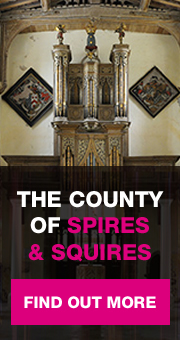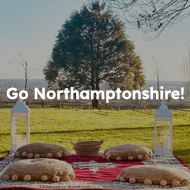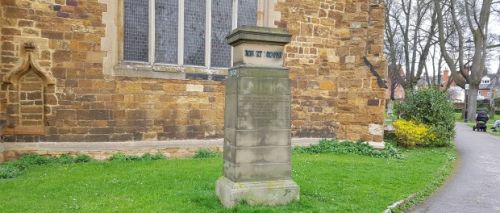23rd March 2018
For a good part of its history, Northamptonshire was at the centre of events that shaped our country, however in recent years, for the most part, the county has forgotten or lost its historical soul. Whilst towns and cities like Canterbury, Lincoln or York celebrate its past, ours disappears in obscurity. True we have no huge castle or fabulous medieval building to hang our history on, but it’s still there, layer upon layer of it. And, if you look closely, much still survives.
Over the coming weeks and months we will be rediscovering our past, writes historian Mike Ingram. You will read about events big and small that helped change Britain, from Magna Carta to the last peasants revolt in England, from the 1460 Battle of Northampton to the Battle of Naseby. We will also look at some of the local families that influenced events, such as the Catesby’s, Woodville’s, Tresham’s, Green’s, Harrington’s and the Vaux’s.
But first, news of a big anniversary. In 2020 it will be the 400th anniversary of the sailing of the Mayflower to America. It was arguably one of the most influential voyages in the history of the world. The ship quite literally carried with it the seed of the American nation. As Winston Churchill said: “habeas corpus, magna carta, the bill of rights, trial by jury and English common law find their most famous expression in the American declaration of Independence.” During the recent budget, it was announced the government will appoint a Government Representative for the celebrations to assist in co-ordinating the UK wide events.
Since the time of King Richard II, Northamptonshire had been a major centre for religious dissidents, first the Lollards and then Puritans, Presbyterians, Baptists and Quakers.
It was Robert Browne’s teachings that inspired the Congregationalists and become known as “The Father of the Pilgrims” and “Grandfather of The Nation” (USA). Browne was born in Rutland during the 1550’s. His most important works were published at Middelburg in 1582: “A Treatise of Reformation without Tarying for Anie”, in which he asserted the right of the church to effect necessary reforms without the authorisation of the civil magistrate; and “A Booke which sheweth the life and manners of all True Christians”, which set out the theory of Congregational independence. His followers became known as Brownists. Most of the Mayflower passengers in 1620 were Brownists, and for 200 years, the Pilgrims were known as the Brownist Emigration.
In 1591, Browne became rector of Achurch cum Thorpe in Northants. He lived a large part of this time with his relatives at Lilford Hall, and conducted certain duties at Lilford Church. It is also recorded that he had preached non-conformist views at The Chapel in nearby Thorpe Waterville.
In 1633, aged 83, Browne became involved in a dispute with his godson, the constable of the Lilford estate, , which ended in blows. Browne was arrested and was so insolent to the justice during his trial that he was put in gaol. He became ill soon after, and died in Northampton Jail. Browne was buried in the graveyard of St. Giles Church in Northampton.
George Washington
The connection between the beginnings of the United States of America and Northamptonshire do not end there! In 1539 or 1540 the Crown sold three manors, including Sulgrave, to Lawrence Washington, a wool merchant who in 1532 had been Mayor of Northampton. Sulgrave Manor remained in the Washington family for three generations.
But, as royalists with notable connections, they found themselves supporting the wrong side during the English Civil War and Lawrence’s great grandson, the Reverend Lawrence Washington, born at Sulgrave Manor in 1602, became destitute with no prospects for either himself or his young family.
Sulgrave Manor was sold to an uncle by marriage and John Washington, eldest son of the Reverend Lawrence, became a merchant seaman and set sail for America to trade with the Virginian colony. He is notable for being the great-grandfather of George Washington. The Northamptonshire Regiment was the first British regular regiment to set foot in America. They were massacred at the battle of Monongahela River (a fictionalised account of the battle can be seen in “The Last of the Mohicans”). It was Washington who guided the survivors out. From 1775, Washington went on to command the Continental Army in the American Revolutionary War and in 1789 was elected first President of the United States.
Benjamin Franklin
The Franklin family had lived on a freehold of about thirty acres in Ecton since at least 1555. Thomas, a blacksmith and farmer who was born in 1598 and Mary had four sons, Thomas (1638-1702), John, Benjamin and the youngest, Josiah (1655-1744). Josiah Franklin, was born at Ecton, on December 23, 1657. He married his first wife, Anne Child, in about 1677 in Ecton they had three children. Around this time he became a Puritan. They emigrated to Boston in 1683; and had four more children after. After Anne’s death, Josiah married Abiah Folger on July 9, 1689 in Boston. Their eighth child, was named Benjamin. He would become one of the founding fathers of the USA and given the title “The First American“. In 1758, Franklin visited Ecton to see his ancestral home and the graves of his Aunt and Uncle which are still in the village churchyard.
Of course, the big question is will Northamptonshire celebrate its American connection in 2020 along with the rest of Britain? As the county missed out on the Magna Carta (something else dear to the Americans) celebrations in 2015 despite it playing such a pivotal part, we hope not.
Reference: NeneQuirer
Your login details have been used by another user or machine. Login details can only be used once at any one time so you have therefore automatically been logged out. Please contact your sites administrator if you believe this other user or machine has unauthorised access.








